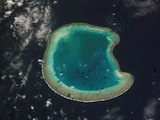séminaire – mardi 4 décembre 2018
 From submarine volcanoes to modern carbonate platforms: new insights from the Mozambique Channel (SW Indian Ocean)
From submarine volcanoes to modern carbonate platforms: new insights from the Mozambique Channel (SW Indian Ocean)
Stéphan Jorry, Ifremer, Brest
mardi 4 décembre 2018, à 14 heures, amphithéâtre ???
Although the long-term evolution of isolated shallow-water carbonate platforms leading to guyot and atoll formation has been the subject of numerous studies during the last decades, its driving processes are still under debate. The Mozambique Channel is characterised by several modern carbonate systems, ranging from 11°S to 21°S in latitudes. These carbonate systems are characterised by reef margins mostly developed on windward sides with internal parts blanketed by sand dunes and numerous reef pinnacles, or by Darwin-type atolls with enclosed lagoons. Dredge sampling, underwater observations and geophysical acquisitions carried out during recent oceanographic cruises at the vicinity of these modern systems have evidenced the occurrence of flat-top terraces and seamounts corresponding to shallow-water carbonate platforms overlying submarine volcanoes. Microfacies analysis and chronological data indicate that those carbonate platforms have developed in tropical settings from Early Miocene to Late Miocene/Early Pliocene times. Faulting, submarine volcanism and karstification evidences affecting the top of the drowned edifices demonstrate that tectonic deformation, rejuvenated volcanic activity and subaerial exposure occurred after, and potentially during, the aggradation of the Neogene platform. Topographic irregularities inherited from volcanism, tectonic and/or subaerial exposure conditions may have influenced the development of these platforms until modern times. During the Quaternary, carbonate gravity systems developed on the slopes edging carbonate platforms, indicating therefore major export processes of carbonate sands and muds to the deep sea.
- extrait:
- lien_externe:
- kc_data:
- a:8:{i:0;s:0:"";s:4:"mode";s:0:"";s:3:"css";s:0:"";s:9:"max_width";s:0:"";s:7:"classes";s:0:"";s:9:"thumbnail";s:0:"";s:9:"collapsed";s:0:"";s:9:"optimized";s:0:"";}
- kc_raw_content:
 From submarine volcanoes to modern carbonate platforms: new insights from the Mozambique Channel (SW Indian Ocean)
From submarine volcanoes to modern carbonate platforms: new insights from the Mozambique Channel (SW Indian Ocean)Stéphan Jorry, Ifremer, Brest
mardi 4 décembre 2018, à 14 heures, amphithéâtre ???
Although the long-term evolution of isolated shallow-water carbonate platforms leading to guyot and atoll formation has been the subject of numerous studies during the last decades, its driving processes are still under debate. The Mozambique Channel is characterised by several modern carbonate systems, ranging from 11°S to 21°S in latitudes. These carbonate systems are characterised by reef margins mostly developed on windward sides with internal parts blanketed by sand dunes and numerous reef pinnacles, or by Darwin-type atolls with enclosed lagoons. Dredge sampling, underwater observations and geophysical acquisitions carried out during recent oceanographic cruises at the vicinity of these modern systems have evidenced the occurrence of flat-top terraces and seamounts corresponding to shallow-water carbonate platforms overlying submarine volcanoes. Microfacies analysis and chronological data indicate that those carbonate platforms have developed in tropical settings from Early Miocene to Late Miocene/Early Pliocene times. Faulting, submarine volcanism and karstification evidences affecting the top of the drowned edifices demonstrate that tectonic deformation, rejuvenated volcanic activity and subaerial exposure occurred after, and potentially during, the aggradation of the Neogene platform. Topographic irregularities inherited from volcanism, tectonic and/or subaerial exposure conditions may have influenced the development of these platforms until modern times. During the Quaternary, carbonate gravity systems developed on the slopes edging carbonate platforms, indicating therefore major export processes of carbonate sands and muds to the deep sea.
- titre:
- From submarine volcanoes to modern carbonate platforms: new insights from the Mozambique Channel (SW Indian Ocean)
- intervenant:
- Stéphan Jorry
- date:
- mardi 4 décembre 2018
